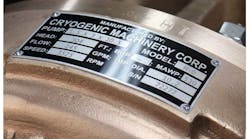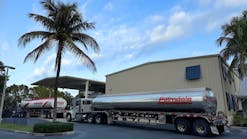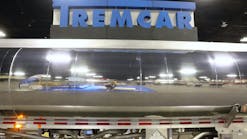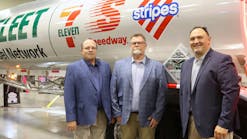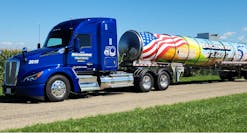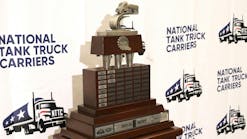WHEN Buddy Casado says that the CLI Transport's fleet works hard, it's no exaggeration. The proof is in the numbers.
As the dedicated transportation company for Sheetz Inc, an operator of 300 convenience superstores in the Mid-Atlantic region, CLI Transport delivers almost 20 million gallons of gasoline a week. It does that with a fleet of just 67 transports operating from six primary locations.
“We have 230 drivers, and we operate our transports 24 hours a day, seven days a week,” says Casado, president of Claysburg, Pennsylvania-based CLI Transport. “In 2003, our petroleum fleet ran a combined total of 12.9 million miles and generated $25.3 million in gross revenue.
“Our per-tractor average for the 67 power units in our fleet is 200,000 miles a year, which we believe is high utilization for a petroleum fleet. Our business model is based on high fleet utilization, and it's part of what makes us successful.”
Billion gallons
The busy fleet delivered more than a billion gallons of gasoline to Sheetz in 2003. “It was the first time we hit a billion gallons, and we expect to do that again in 2004,” Casado says.
Even more noteworthy than the billion-gallon milestone, is the fact that the carrier did it without sacrificing safety. In addition to several National Tank Truck Carriers (NTTC) safety awards, CLI Transport was the recipient of the American Trucking Associations' (ATA's) 2003 President's Trophy for its comprehensive safety program.
“I am very proud of our employees for their outstanding dedication to safety,” Casado says. “Safety is our number one priority. This award verified our commitment, to providing safe, dependable, and efficient transportation service to our customers.”
Steve Sheetz, Chairman of the Board of both Sheetz, Inc. and Convenience Management, the general partner of CLI Transport, admits that he was uneasy about the notion of hauling fuel. “I was the last hold-out on the decision to create CLI Transport to haul fuel. Eleven years later, I couldn't be happier with the dedication that ensures Sheetz stores always have fuel. I couldn't be more proud of the sparkling clean CLI trucks driven by dedicated safety-minded professionals.”
The combined focus on safety and high productivity was in place from the very start of the CLI Transport operation. Started in 1992 as a wholly owned subsidiary of Sheetz Inc, the carrier initially was called Convenience Leasing Inc. The fleet operation was spun off to a separate entity, CLI Transport, in 1999.
“Sheetz sought a dedicated hauler for three basic reasons — safety, image, and profitability,” Casado says. “We began in Altoona (Pennsylvania) with three petroleum transports and nine drivers. Within the first eight months we grew to 15 drivers, and we met our three-year growth plan by the end of that first year. We haven't looked back since.”
During that first year, the fleet operation obtained common carrier authority. “This is a separate business from the Sheetz convenience stores,” Casado says.
The chief objective of the CLI Transport fleet is to ensure that Sheetz has the gasoline and diesel fuels needed to serve customers around the clock, 365 days a year.
“Even during the worst snow storms of this past winter, we wanted the stores to remain open and stocked with gasoline,” Casado says. “Customers know they can always find a Sheetz that's open.”
Today, Sheetz has stores across Pennsylvania, Maryland, Virginia, West Virginia, and Ohio. The company has just opened stores in North Carolina.
“Sheetz takes a methodical approach to growth,” Casado says. “Management targets a specific corridor or area, and grows until that area is filled in. All of the Sheetz stores are outside the urban beltways.”
CLI Transport's 67 trucks are dispersed across the Sheetz marketing area to serve the stores. Transports are based at terminals in Altoona, Pittsburgh, and Harrisburg, Pennsylvania; and Fairfax, Roanoke, and Richmond, Virginia. The company plans to open terminals in Ohio and North Carolina later this year.
Operating out of those locations, the petroleum transports cover a lot of ground. Some trips are as many as 200 miles each way.
Managing the spread-out Sheetz petroleum distribution operation could be extremely challenging. According to Jack Leach, manager of petroleum distribution, CLI Transport has simplified the process with computer systems and software from Aspen Technology Inc and Summary Systems Inc. The products combine state-of-the-art distribution management and fleet tracking capabilities.
Petroleum distribution specialists at CLI Transport's corporate office in Claysburg use the AspenTech software to develop delivery schedules that are precisely calculated down to a tenth of an hour. The system constantly monitors each day's deliveries, and schedule adjustments can be made instantly when delays occur.
AspenTech software helps lower transportation costs by improving utilization of resources and payload size, as well as boosting routing and scheduling efficiency. Business processes addressed by the software include prevention of run-outs, automated fuel replenishment, lubes distribution, and order entry.
On-board computers
Actual tracking of the fleet is done with Summary Systems equipment. Tractors are fitted with Fleet Commander hardware that includes a wireless modem, on-board computer, keypad, and GPS unit.
Employees working at central dispatch use Fleet Find software for real-time communication and vehicle tracking. The wireless link enables distribution specialists to find the vehicle location at any time. Distribution specialists can monitor where a vehicle has been, route taken, and amount of time spent at each stop. Driver logs are compiled automatically using the system.
The computerized fleet management capabilities benefit CLI Transport's 230 drivers as much as the distribution specialists. The system helps ensure that each driver is scheduled for 17 days of work per month. On a weekly basis, drivers work four 10-hour shifts.
“Our work schedule fits well with the new hours-of-service rules, and our drivers seem pleased with that,” Casado says. “Based upon our scheduling, many of our drivers benefit from the 34-hour restart.”
Driver selection is a careful process, and the company looks for individuals with a strong work ethic and safety focus. As part of the two-week new-hire training, drivers are provided with notebooks containing detailed delivery instructions, including layouts of the fuel delivery system at each store. The diagrams show drivers the safest way to enter and exit the facility.
“We stress safety in every way we can,” Casado says. “This includes paying out cash bonuses for safe performance three times a year. Between 95% and 98% of our drivers earn the bonus, which totals a maximum of $2,400 a year per driver.”
Leased fleet
Well-specified, well-maintained vehicles are just as important for safe operations. CLI Transport drivers are assigned to late model tractors, most of them leased through Fox & James NationaLease. The company also leases petroleum trailers from Fox & James.
“We've leased tractors and trailers through partnering with Fox & James from the outset,” Casado says. “Fox & James provided us with our first three petroleum transports in Altoona, and they have grown with us since then.
“Full-maintenance leasing is a part of the business model we put together, and it's an aspect of what makes us successful. Service to Sheetz stores is our primary focus.”
Because of high mileages (211,000 miles a year on average for power units at the Pittsburgh terminal), tractors are on a three-year lease. Tank trailers are leased for six-year intervals. “We can put 12-14 years worth of wear on a tank trailer in six years,” Casado says.
Conventional tractors
Freightliner conventionals predominate for tractors, and the Columbia is the newest model. The drivetrain includes primarily Caterpillar engines — with a recent switch to the Mercedes-Benz MBE-4000 engine rated for 450 horsepower — Fuller 10-speed transmission, and Meritor tandem-drive axles.
“We chose the Mercedes engine, because we believe it will be more economical to operate,” Casado says. “It's premature to confirm engine reliability over the full lease term, but we're optimistic. We're also getting positive feedback from our drivers, specifically regarding the engine's power and torque.”
Tractors and trailers have air suspensions, and tractor cabs are on air ride. The units are equipped with aluminum disc wheels.
Recently, the company began a test of Michelin X-One widebase singles. “We selected the X-One for the weight savings,” Casado says. “We've reduced weight by 800 pounds for each combined unit, which enables us to carry 100 gallons more of gasoline. We believe that the time is right for widebase tires and that Michelin has the right product for our needs.”
All of the petroleum trailers are supplied by Heil Trailer International. Constructed with five compartments — two of them separated by a double bulkhead — each trailer has a 9,200-gallon capacity. Tank hardware includes Civacon overfill protection, vapor recovery, API bottom loading adapters, and internal valves.
Trailers carry spill kits that include absorbent booms, fuel solidifier and absorbent pads.
Leased maintenance
Leasing companies handle virtually all of the vehicle maintenance for the CLI Transport fleet. This includes handling service calls on the road. The leasing companies also provide spare tractors when CLI Transport vehicles are in the shop.
“Our goal is to have trucks on the road 24 hours a day, seven days a week delivering fuel, not spending time in the shop for serious issues beyond preventative maintenance,” Casado says. “Full service maintenance leases help us achieve that goal while ensuring our units are safe to be operating.”
Fox & James, CLI Transport's partner since the beginning, runs captive shops for CLI Transport in Pittsburgh and Fairfax. Other Fox & James facilities are open to other leasing customers. Typically, Fox & James employs two to three mechanics at each captive location.
“High mileage means the mechanics service our vehicles three times as often,” Casado says. “We expect and depend on the mechanics to keep us on the road with safe and well-maintained units, despite the number of miles we put on.”
Well-maintained, well-specified vehicles combined with state-of-the-art fleet management technology virtually guarantees that CLI Transport will continue to post some of the most impressive performance statistics in the tank truck industry.

